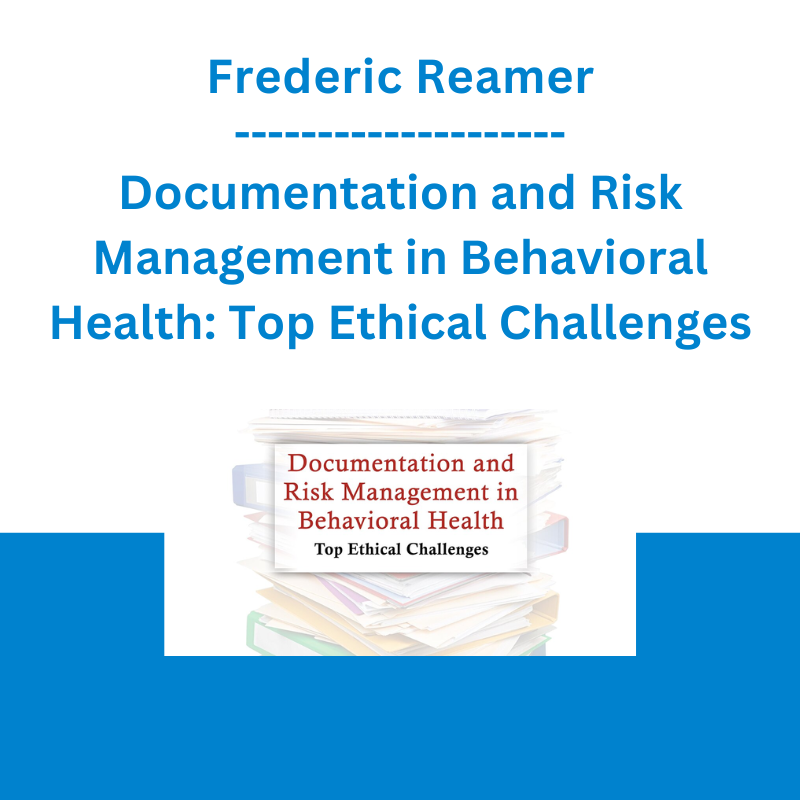*** Proof of Product ***
Exploring the Essential Features of “Frederic Reamer – Documentation and Risk Management in Behavioral Health: Top Ethical Challenges”
Speaker: Frederic G. Reamer, PhD
Duration: 6 Hours 23 Minutes
Format: Audio and Video
Copyright: Aug 02, 2023
Media Type: Digital Seminar
Description
Sometimes regarded as a “necessary evil,” the reality is that the quality of practitioners’ documentation often determines the outcomes of lawsuits and licensing board complaints filed against practitioners.
Skilled documentation that is consistent with ethical standards can ensure you are providing quality services to your clients and often leads to positive litigation and licensing board decisions. Skilled documentation can also save you valuable time.
In contrast, poor documentation can be disastrous when introduced as evidence in court and licensing board proceedings.
Watch Dr. Frederic Reamer, a leading author of books and other publications on risk management and documentation in behavioral health, as he draws on his extensive experience as an expert witness for more than 30 years in litigation and licensing board cases throughout the United States.
Dr. Reamer will provide a comprehensive overview of:
- State-of-the-art documentation standards
- When to be vague and detailed in clinical notes
- The advantages and disadvantages of short and long notes
- Key ethical issues and standards related to documentation in behavioral health
- Challenges when using electronic records
- Relevant statutes, regulations, and case law
- Common documentation mistakes
- Practical documentation strategies to protect clients and clinicians
- And much more!
Too often practitioners’ documentation exposes them to considerable risk related to audits and lost revenue. Documentation is an essential element of behavioral health – don’t let the “necessary evil” affect your practice and clients.
Purchase now!
Speaker
Frederic G. Reamer, PhD
School of Social Work, Rhode Island College
Frederic G. Reamer, PhD, Professor Emeritus has taught in the graduate program of the school of social work, Rhode Island College, Providence, Rhode Island for 40 years. Dr. Reamer received his PhD from the University of Chicago and has served as a social worker in correctional and mental health settings. He chaired the national task force that wrote the National Association of Social Workers Code of Ethics and served on the task force that added technology standards to the code. Dr. Reamer lectures both nationally and internationally on the subjects of professional ethics, professional malpractice and liability, and documentation. In addition to ethics, his research and a teaching have addressed a wide range of human service issues, including mental health, health care, criminal justice, and public welfare. Dr. Reamer has conducted extensive research on professional ethics and has been involved in several national research projects sponsored by The Hastings Center, Carnegie Corporation, Haas Foundation, and Center for Bioethics of the University of Pennsylvania. Dr. Reamer has been an expert witness and formal ethics consultant in more than 130 litigation and licensing board cases throughout the United States. He is the author of many books and other publications on ethical standards in behavioral health, risk management, and documentation.
Speaker Disclosures:
Financial: Frederic Reamer has an employment relationship with Rhode Island College. He receives royalties as a published author. Frederic Reamer receives a speaking honorarium and recording royalties from PESI, Inc. He has no relevant financial relationships with ineligible organizations.
Non-financial: Frederic Reamer serves as an advisory board member of Ocean State Stories, Pell Center, Salve Regina University and an advisory editor for the Encyclopedia of Social Work Online. He is a volunteer with the Rhode Island Department of Corrections and the Providence Police Department Training Academy.
Objectives
- Identify the diverse purposes of documentation.
- Address documentation challenges related to client privacy, confidentiality, and privileged communication.
- Identify the implications of skilled documentation for risk management in behavioral health.
- Avoid common documentation mistakes.
- Develop documentation protocols consistent with ethical standards in behavioral health.
- Implement ethics-informed documentation strategies to protect clients and prevent lawsuits and licensing board complaints.
Outline
The Role of Documentation in Behavioral Health
- Effective client assessment
- Planning and delivering services
- Accountability to third parties
- Continuity and coordination of services
- Supervision of clinicians and staff
- Evaluation of services
Policies and Protocols for Documentation Challenges
- What to document and what not to document
- Language and terminology
- Use of electronic health records
- Ways to enhance credibility and mistakes to avoid
- Access and disclosure of documents to clients or third parties
- Record retention
Ethical Standards
- Privacy: Protecting client information in records
- Confidentiality: Disclosure of protected health information
- Privileged communication: Disclosure during legal proceedings
- Informed consent: Consent to treat
- Defamation of character: Preventing libel and slander
Ethics Informed Documentation Strategies
- Vague documentation v. detailed documentation
- Long notes v. short notes
- Decisions about third-party access to records
Documentation and Risk Management: Malpractice and Licensing Board Complaints
- The nature of malpractice: Documentation issues
- Malpractice and licensing board risks related to documentation
- Standards of care in documentation
- Acts of omission in documentation
- Acts of commission in documentation
- Responding to subpoenas
- Documentation challenges in the digital age
Practical Tips on the Do’s and Don’ts of Mental Health Documentation
- Examples of good and bad notes
- Case examples
Target Audience
- Counselors
- Social Workers
- Psychologists
- Addiction Counselors
- Physicians
- Marriage & Family Therapists
- Psychiatrists
- Behavioral Health Nurses
- Case Managers
- Mental Health Administrators
- Office Managers
- Art Therapists
- Other Mental Health Professionals
Please see the full list of alternative group-buy courses available here: https://lunacourse.com/shop/










 Atlas API Training - API 570 Exam Prep Training Course
Atlas API Training - API 570 Exam Prep Training Course  Dave Landry - Stock Selection Course
Dave Landry - Stock Selection Course  Oliver Velez - Essential Strategy Of Trade For Life
Oliver Velez - Essential Strategy Of Trade For Life  Ed Ponsi - Forex Trading
Ed Ponsi - Forex Trading